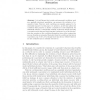Free Online Productivity Tools
i2Speak
i2Symbol
i2OCR
iTex2Img
iWeb2Print
iWeb2Shot
i2Type
iPdf2Split
iPdf2Merge
i2Bopomofo
i2Arabic
i2Style
i2Image
i2PDF
iLatex2Rtf
Sci2ools
ECAL
2007
Springer
2007
Springer
Individual Selection for Cooperative Group Formation
It is well known that certain environmental conditions, such as a spatially structured population, can promote the evolution of cooperative traits. However, such conditions are usually assumed to be externally imposed. In this paper, we present a model that allows the conditions that promote or hinder cooperation to arise adaptively via individual selection. Consequently, instead of selection simply favouring cooperation under imposed environmental conditions, in our model selection also operates on the conditions themselves via a niche construction process. Results are presented that show that the conditions that favour cooperation can evolve, even though those that favour selfish behaviour are also available and are initially selected for.
Artificial Intelligence | Certain Environmental Conditions | Cooperative Traits | ECAL 2007 | Environmental Conditions |
| Added | 07 Jun 2010 |
| Updated | 07 Jun 2010 |
| Type | Conference |
| Year | 2007 |
| Where | ECAL |
| Authors | Simon T. Powers, Alexandra S. Penn, Richard A. Watson |
Comments (0)

